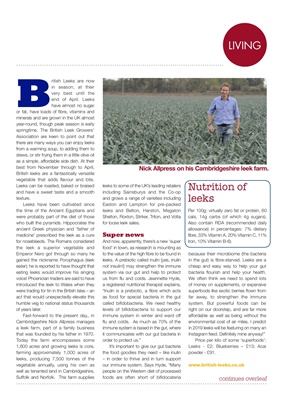
KITLIVING
continues overleaf
British Leeks are now
in season, at their
very best until the end
of April. Leeks have
almost no sugar or fat,
have loads of fibre, vitamins and minerals
and are grown in the UK almost yearround,
though in peak season in early
springtime. The British Leek Growers'
Association are keen to point out that
there are many ways you can enjoy leeks
from a warming soup, to adding them to
stews, or stir frying them in a little olive oil
as a simple, affordable side dish. At their
best from November through to April,
British leeks are a fantastically versatile
vegetable that adds flavour and bite.
Leeks can be roasted, baked or braised
and have a sweet taste and a smooth
texture.
Leeks have been cultivated since
the time of the Ancient Egyptians and
were probably part of the diet of those
who built the pyramids. Hippocrates the
ancient Greek physician and 'father of
medicine' prescribed the leek as a cure
for nosebleeds. The Romans considered
the leek a superior vegetable and
Emperor Nero got through so many he
gained the nickname Porophagus (leek
eater); he is reported to have thought that
eating leeks would improve his singing
voice! Phoenician traders are said to have
introduced the leek to Wales when they
were trading for tin in the British Isles - an
act that would unexpectedly elevate this
humble veg to national status thousands
of years later.
Fast-forward to the present day,, in
Cambridgeshire Nick Allpress manages
a leek farm, part of a family business
that was founded by his father in 1970.
Today the farm encompasses some
1,600 acres and growing leeks is core,
farming approximately 1,000 acres of
leeks, producing 7,500 tonnes of the
vegetable annually, using his own as
well as tenanted land in Cambridgeshire,
Suffolk and Norfolk. The farm supplies
Nutrition of
leeks
Per 100g:
leeks to some of the UK's leading retailers
including Sainsburys and the Co-op
and grows a range of varieties including
Easton and Lampton for pre-packed
leeks and Belton, Harston, Megaton
Shelton, Roxton, Striker, Triton, and Volta
for loose leek sales.
Super news
And now, apparently, there's a new 'super
food' in town, as research is mounting as
to the value of the high fibre to be found
in leeks. A prebiotic called inulin may
strengthen the immune system via our gut
and help to protect us from flu and colds.
Jeannette Hyde, a registered nutritional
therapist explains, "Inulin is a prebiotic,
a fibre which acts as food for special
bacteria in the gut called bifidobacteria.
We need healthy levels of bifidobacteria
to support our immune system in winter
and ward off flu and colds. As much as
70% of the immune system is based in
the gut, where it communicates with our
gut bacteria in order to protect us."
It's important to give our gut bacteria
the food goodies they need - like inulin
- in order to thrive and in turn support
our immune system. Says Hyde, "Many
people on the Western diet of processed
foods are often short of bifidocateria
because their microbiome (the bacteria
Nick Allpress on his Cambridgeshire leek farm.
in the gut) is fibre-starved. Leeks are a
cheap and easy way to help your gut
bacteria flourish and help your health.
We often think we need to spend lots
of money on supplements, or expensive
superfoods like exotic berries flown from
far away, to strengthen the immune
system. But powerful foods can be
right on our doorstep, and are far more
affordable as well as being without the
environmental cost of air miles. I predict
in 2019 leeks will be featuring on many an
Instagram feed. Definitely mine anyway!"
Price per kilo of some 'superfoods':
Leeks - £2; Blueberries - £13; Acai
powder - £91.
www.british-leeks.co.uk